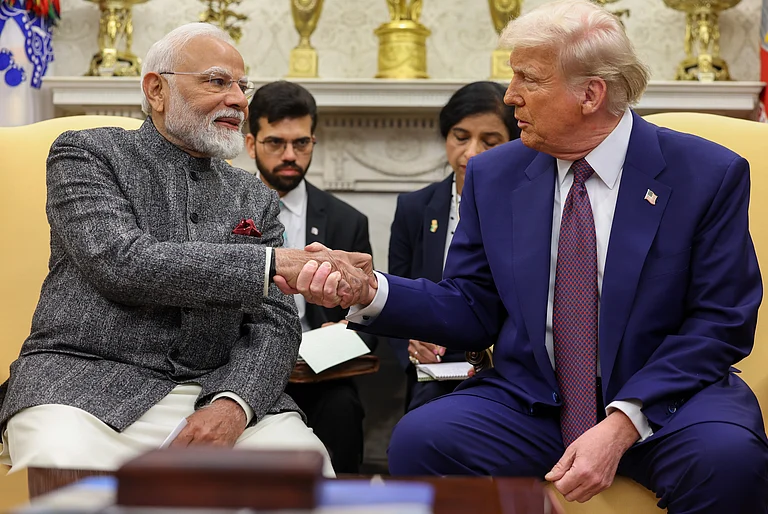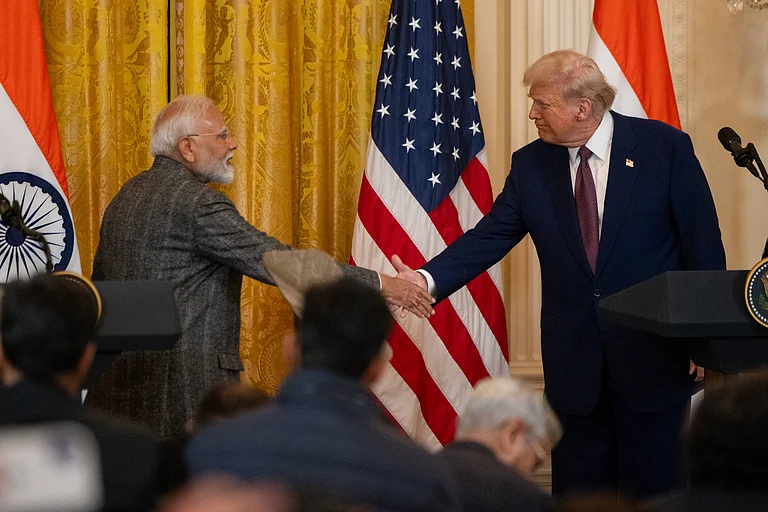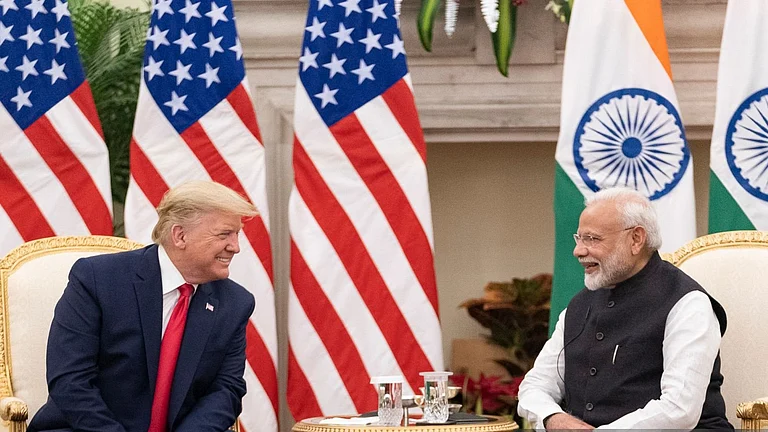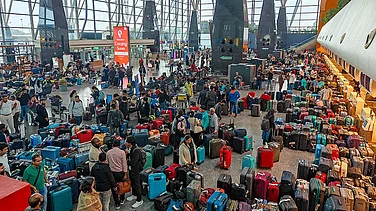India signed a Comprehensive Economic and Trade Agreement (CETA) with the United Kingdom on July 24. The trade agreement covers 26 sectors from tariffs to technology.
The pact has many things which were agreed upon by India for the first time, including slashing of import duties on automobiles, and inclusion of chapters like Trade and Gender Equality. It covers areas such as tariffs, services, digital trade, intellectual property, and government procurement.
CETA is India's 16th and one of its most wide-ranging trade agreements. The pact is aimed at doubling bilateral trade in goods and services to USD 112 billion from USD 56 billion at present. It is essential to understand the main advantages of the CETA for Indian businesses.
How Will India Benefit From This Trade Deal?
The new trade deal will result in duty-free trade of 45 per cent of Indian exports which used to be taxed at 4 per cent to 16 per cent. The items include textiles, footwear, carpets, automobiles, seafood, and fresh fruits such as grapes and mangoes, will enter the UK down from earlier.
Tariffs on whisky and gin imports will be sharply reduced, initially falling from 150 per cent to 75 per cent. Over a ten-year implementation period, these duties will be gradually brought down further to 40per cent.
The duty rates for cars have been revised from the existing rate of more than 100 per cent to just 10 per cent. British-made vehicles, including brands like Jaguar and Land Rover, will gain from the tariff reduction, allowing easier access to the Indian automotive market. The lower duties are expected to make these vehicles more affordable for Indian buyers.
The remaining exports covering petroleum, pharmaceuticals, diamonds, and aircraft components, already had zero duty access (Zero MFN tariffs) even without this pact. The UK has agreed to eliminate tariffs on all Indian goods, with only a few agricultural items like rice excluded.
The UK has excluded various meat products, egg-based items, semi-milled or fully milled rice, and solid-form cane or beet sugar from this deal and the tariffs will continue like before.
The deal will eliminate duties on more than 95 per cent of India's agricultural and processed food products upon implementation.
Coastal states such as Andhra Pradesh, Odisha, Kerala, and Tamil Nadu are expected to benefit significantly from the agreement. Products like shrimp, tuna, fishmeal, and feeds, which currently face tariffs ranging from 4.2 to 8.5 percent, will now be allowed duty-free entry. This is likely to lead to a substantial increase in India's marine exports.
India’s premium branded exports, especially in the beverages and condiments sectors, are set to receive a boost under the agreement. Currently, the UK imports only limited quantities from India -1.7 percent of its coffee, 5.6 percent of its tea, and 2.9 percent of its spices.
The deal includes provisions for inflation adjustment of the MIP every 15 years and requires joint review by both governments before any indexation is applied.
India has excluded several high-sensitivity agricultural products from any tariff concessions. This includes fresh apples, walnuts, whey and modified whey, blue-veined cheese, and specific seed categories, gold bars, and smartphones.
India’s textile sector, powered by women artisans from regions like Kanchipuram, Bhagalpur, Jaipur, and Varanasi, will see key gains. Iconic Kolhapuri chappals, crafted by women-led artisan groups in Maharashtra, will now receive tariff-free access to the UK’s premium market.
Double Contribution Convention has been introduced which allows over 75,000 Indian workers on short UK assignments to continue paying into India's social security system without dual contributions.
Explaining how DCC is beneficial, PM Modi said, “It will promote ease of doing business, reduce cost of doing business, and increase the confidence of doing business. Additionally, the UK’s economy would benefit from India’s skilled talent. These agreements will enhance investments and generate new employment opportunities in both countries. Moreover, as agreements reached between two democracies and two of the world’s major economies, they will lend support to global stability and global prosperity."
As part of the trade agreement, sectors such as IT and IT-enabled services, financial and legal services, professional and educational services, and digital trade will enjoy expanded access to the UK market. “Indian professionals, including those deployed by companies to work in UK across all services sectors, professionals deployed on contracts such as architects, engineers, chefs, yoga instructors, and musicians, will benefit from simplified visa procedures and liberalised entry categories, making it easier for talent to work in the UK,” India’s Commerce Ministry said in a statement on Thursday.
How Will The Trade Benefit UK?
The UK used to face tariffs on over 94 per cent of items they exported from India and under the agreement, India will eliminate tariffs on 90 per cent of UK goods. Tariffs on 64 per cent of British goods will be eliminated immediately, including salmon, lamb, aircraft parts, machinery, and electronics.
Another 26 per cent, including chocolates, soft drinks, cosmetics, and auto parts, will see tariffs phased out over the next 10 years.
For cosmetics like soaps, perfumes, shaving creams, and nail polish, current tariffs of 10-20 per cent will either be eliminated on day one or gradually phased out. India will also remove duties on medical devices from the UK.
India will cut tariffs on silver, the largest import item from the UK to zero in 10 years.
India, for the first time, has given tariff concessions for the auto sector in its free trade agreement, and it's likely to trigger similar demands from Japan, the EU, South Korea, and the US.
India has opened a dedicated Tariff Rate Quota (TRQ) for passenger cars from the UK. For large-engine petrol cars above 3000 cc and diesel cars over 2500 cc, traditionally luxury imports, India has committed to lowering the current over 100 per cent customs duty to 10 per cent over 15 years, within a quota starting at 10,000 units and rising to 19,000 in year five.
For mid-sized cars (1500-2500 cc diesel / up to 3000 cc petrol), a 50 per cent in-quota duty applies initially, falling to 10 per cent by year five. Small cars under 1500 cc follow a similar tariff reduction path with a growing quota. These in-quota vehicles enjoy sharply reduced duties, while out-of-quota imports still face tariffs ranging from 95 per cent to 50 per cent, depending on vehicle size and year.
Further, India will allow duty cuts for UK-origin alcoholic including whisky, brandy, rum, vodka, liqueurs, mead, cider, and tequila.
These products, which currently face a base customs duty of 150 per cent, will see steep reductions but only if they meet a Minimum Import Price (MIP) threshold of USD 5-6(Rs 400-500) per 750 ml bottle.
For qualifying imports, the duty will be gradually lowered from 110 per cent in the first year to 75 per cent by year 10, through equal annual reductions.
India has granted unprecedented market access to UK suppliers in the government procurement (GP) chapter, a major shift from its traditionally protectionist approach. For the first time, India will open about 40,000 high-value contracts from central ministries and departments in sectors such as transport, green energy, and infrastructure to UK bidders.
According to think tank GTRI, in a significant concession, India has accepted language in the Intellectual Property chapter of the FTA that subtly curtails its ability to issue compulsory licences, a critical tool for accessing life-saving technologies during emergencies.
"For the first time in any trade agreement, India has explicitly agreed to wording that stresses the need for "adequate remuneration" to patent holders, aligning with WTO's TRIPS Article 31(h)," GTRI has said.
India has opened key segments of its services economy to British firms, granting access in sectors such as accounting, auditing, financial services (with FDI in insurance capped at 74 per cent), telecom (allowing 100 per cent FDI), environmental services, and auxiliary air transport.
The UK is granting commercial presence rights in sectors like computer services, consultancy, and environmental services. It has offered an annual quota of 1,800 visas for niche roles like yoga instructors and classical musicians.






















